 Hen nesting boxes are a way of organizing your hens and their business of egg-laying. If you do not provide nesting boxes, you could find eggs everywhere as if you were at an "Easter Egg Hunt". You wouldn't know where they were laid, or how fresh they were.
Hen nesting boxes are a way of organizing your hens and their business of egg-laying. If you do not provide nesting boxes, you could find eggs everywhere as if you were at an "Easter Egg Hunt". You wouldn't know where they were laid, or how fresh they were.
Organize your chicken coop with nesting boxes on one side, inside the chicken coop. Hens will inately seek a nesting box to be quiet, and finish the process of laying their egg. Nesting boxes afford them a quiet, clean space to relax, and lay their egg undisturbed..
I have six nesting boxes in my chicken coop, in two rows of three. The first row is mounted off of the chicken coop floor at 18", and the second row begins at 36" off of the chicken coop floor. My nesting boxes are a little larger than is necessary because I have the room and my chickens are the larger, heavier breeds. In the photos, my nesting boxes are 16" wide, 14" deep, and heights at 18" high and 12" high, respectively.

Make sure your nesting boxes are secured to hold the weight of several hens. A minimum size for nesting boxes is 12"w x 12"d x 12"h. If you have the room, make your nesting boxes a little larger for your hens. Nesting boxes can be make out of plywood. I have seen vintage metal hen nesting boxes, that come as one piece or row, at flea markets. The nesting box is open on one side where the hen enters and lays down. Create a little lip on the front of each nesting box so the hen has something to grip on when entering her nesting box, and to prevent eggs from rolling out.
Dry fresh bedding consisting of straw or pine shavings will be comfortable for laying hens, and keep their eggs clean and secure until they are collected. Rotate bedding out on a regular basis to the manure box, for instance, or your compost pile. Hens do not normally dirty their nesting boxes, but clean out any manure droppings, or if an egg has somehow cracked and broken open in the nesting boxes. Broken eggs can attract ants.

Each hen does not lay at the same time, so you do not need to provide a nesting box for every single hen. A rule of thumb I like is to provide at least one nesting box for every 3 hens in your flock. Sometimes you might have a few social hens using one nesting box together. Also, you might find you have a clutch of eggs in one nesting box that several hens have used, one after another.
If you like, you can even track your egg production by writing in a notebook or a journal how many eggs per day you collected, and any other observations. Try and follow a routine for yourself and your hens, by collecting your eggs about the same time each morning or each evening.
Collect your eggs every day from your nesting boxes, either with a nice somewhat insulated basket or even with recycled egg cartons. Be careful not to "clang" your eggs together. Freshly laid eggs are remarkable. They come complete with an invisible protective coating from the hen that keeps them fresh. For that reason, you should not wash or rinse your eggs, unless they have a bit of manure on them. Collected eggs are ready for your refrigerator to keep until you are ready to eat, cook, or bake with them.

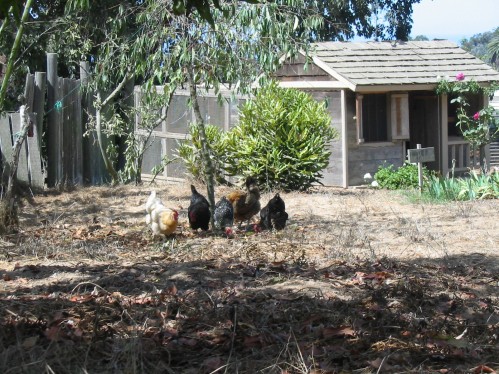 When we bought our property in the late '90's, it was sadly run down, but with a few treasures such as an old child's playhouse close to our garage. Once we were acclimated, we turned our attention to the potential of gardens, shaped trees, and desirable landscape. Soon after that we dragged the extremely heavy child's playhouse, long abandoned, down to a quiet southwest corner of our property. We saw the potential for modifying this "cutie pie" house into a perfect country coop for our soon-to-be-arriving hens.
When we bought our property in the late '90's, it was sadly run down, but with a few treasures such as an old child's playhouse close to our garage. Once we were acclimated, we turned our attention to the potential of gardens, shaped trees, and desirable landscape. Soon after that we dragged the extremely heavy child's playhouse, long abandoned, down to a quiet southwest corner of our property. We saw the potential for modifying this "cutie pie" house into a perfect country coop for our soon-to-be-arriving hens.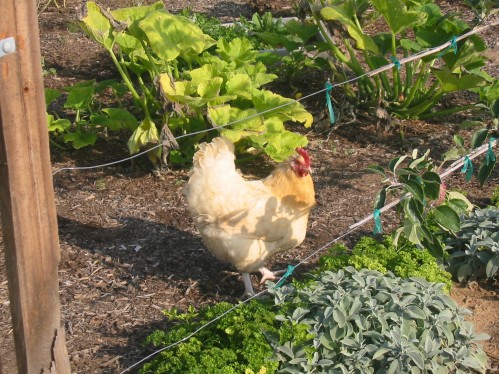
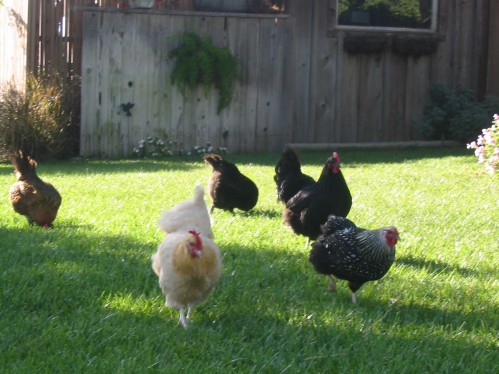 Since I started writing about our chickens, there has been a lot of interest and questions on how to care for them. What are the components of a good chicken coop, and what kind of environment provided makes for healthy, happy, chickens. I think that many potential backyard enthusiasts would like to have chickens, but don't know what all is necessary to provide for them. I hope that I can clarify that for you.
Since I started writing about our chickens, there has been a lot of interest and questions on how to care for them. What are the components of a good chicken coop, and what kind of environment provided makes for healthy, happy, chickens. I think that many potential backyard enthusiasts would like to have chickens, but don't know what all is necessary to provide for them. I hope that I can clarify that for you.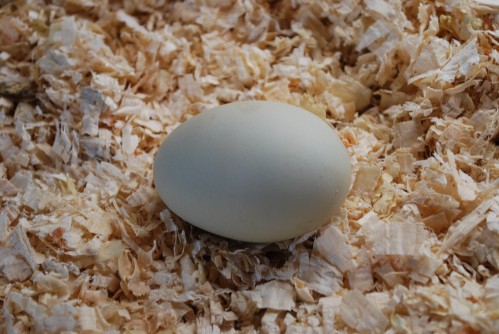 Yesterday morning, I was opening up the shutters and door of the chicken coop for my hens to start their day, and I spotted a "miracle egg" in one of their nesting boxes. Miracle, because it was simply perfect in shape, size, and shell. Miracle, because it was a beautiful pastel blue-green colored egg, laid by Julia, my honey-colored Ameraucana hen. Miracle, because eggs are more of a rarity than the norm in our flock these days. Miracle, because Julia is a six-year old hen, hopelessly past her egg-laying prime, and please don't tell her. Miracle, because it is yet another sign of spring approaching, with increasing daylight lengths stimulating Julia to lay a perfect egg.
Yesterday morning, I was opening up the shutters and door of the chicken coop for my hens to start their day, and I spotted a "miracle egg" in one of their nesting boxes. Miracle, because it was simply perfect in shape, size, and shell. Miracle, because it was a beautiful pastel blue-green colored egg, laid by Julia, my honey-colored Ameraucana hen. Miracle, because eggs are more of a rarity than the norm in our flock these days. Miracle, because Julia is a six-year old hen, hopelessly past her egg-laying prime, and please don't tell her. Miracle, because it is yet another sign of spring approaching, with increasing daylight lengths stimulating Julia to lay a perfect egg.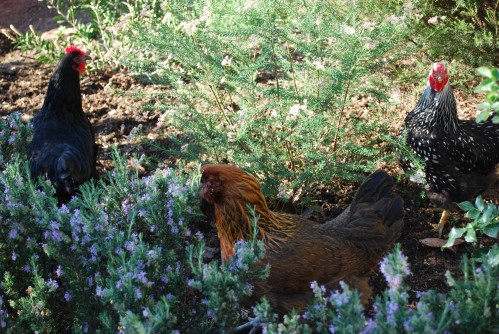 In the photo above are my beloved hens, Louise, Julia, and J.Lo, named after the posh Hollywood crowd. Believe me, besides being pretty, they have attitude, too.
In the photo above are my beloved hens, Louise, Julia, and J.Lo, named after the posh Hollywood crowd. Believe me, besides being pretty, they have attitude, too.